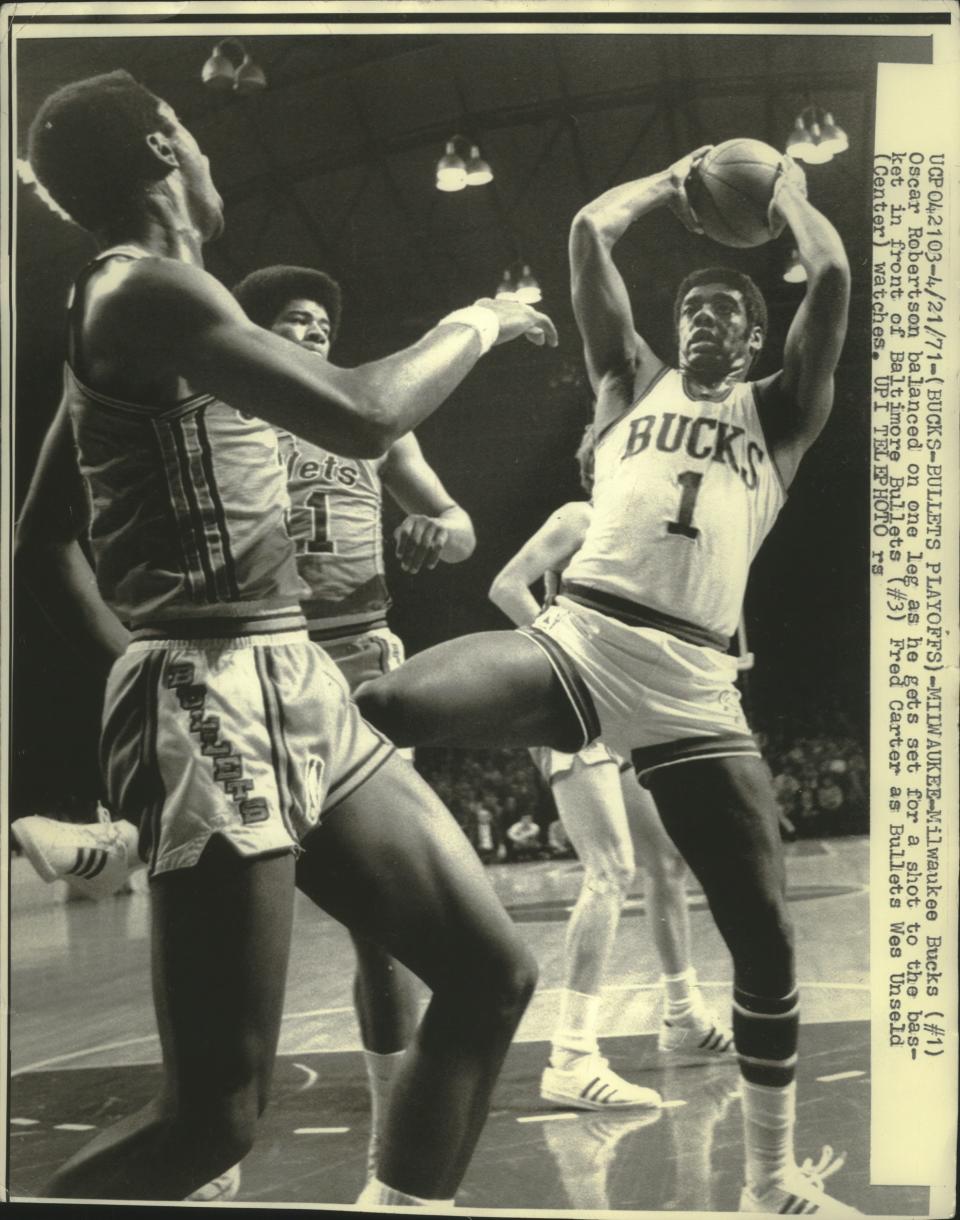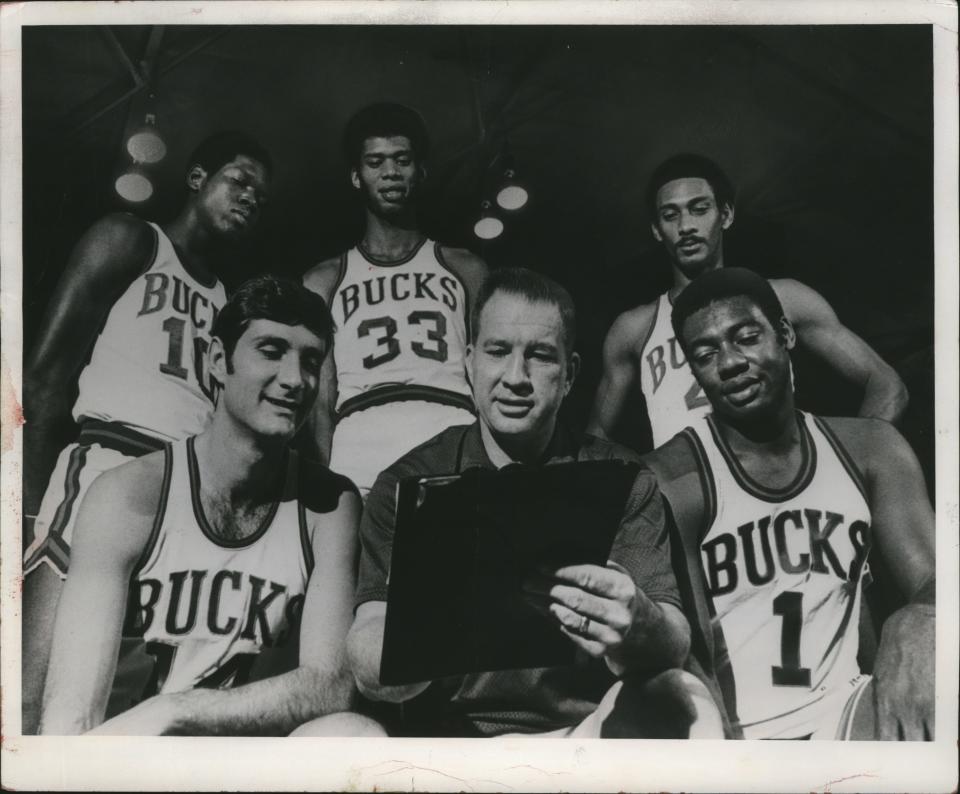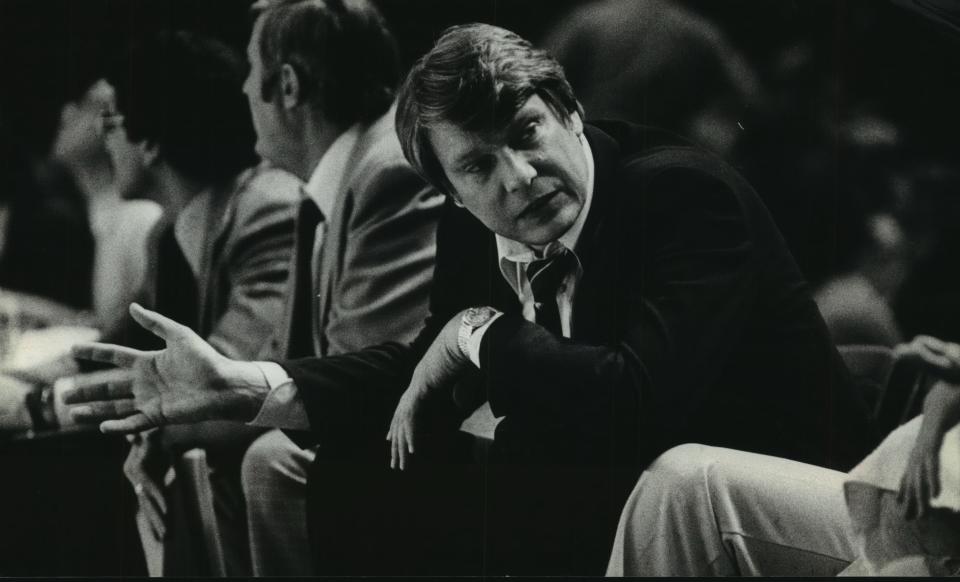A look back at when the Bucks convinced Oscar Robertson to join the fold in 1970

This story first appeared in 2020 during the COVID-19 shutdown as part of the "50 in 50" series looking at the 50 greatest Wisconsin sports moments of the previous 50 years (this was No. 23).
To get a transcendent superstar from Cincinnati, the Milwaukee Bucks sought counsel from an overqualified recreation director in Boston.
Well, Wayne Embry had been the recreation director for a year, though he wound up taking a front-office position with the Bucks in 1970. And maybe overqualified is a stretch since Embry was still just 32 years old, having finished his NBA career with a solo season on the expansion Milwaukee Bucks.
Prior to that, he'd spent two seasons playing with the Celtics in Boston, and before that, eight seasons in Cincinnati, including five all-star appearances with the Royals. During his tenure, he played alongside the one and only Oscar Robertson.
"Oscar Robertson is the greatest basketball player of the century," Embry said during his season with the Bucks, which is saying something considering Embry had just played two years alongside late-career Bill Russell.
RELATED 50 greatest Wisconsin sports moments of the past 50 years
"There have been other players who could do certain things better — superstars like Bob Cousy, Jerry West, Bill Russell, Wilt Chamberlain, Elgin Baylor. But none of them can touch Oscar as an all-around player."
In his 10 years with the Royals, Robertson never missed an all-star game. He averaged 10.3 assists and 8.5 rebounds to accompany his 29.3 points per game in that decade. He averaged a triple-double in 1961-62 and finished within one-tenth of a rebound of averaging another in 1963-64. It's a feat only Russell Westbrook has matched.
At worst, Big O was one of the biggest names in basketball.
Embry, who went on to become the NBA's first African American general manager in 1972 when he took the Bucks' reins, was tasked with talking up Milwaukee to Robertson, who was on his way to an acrimonious divorce with the Royals and their coach — another player on Embry's list, Cousy.
"I wanted to know the organizational structure, the situation," Robertson said then. "Besides the finances, of course. Wayne has a lot of respect for the people there. ... I don't really know anything about Milwaukee, so you have to depend on what your friends tell you."
On April 21, 1970, just one day after the Bucks were eliminated by the New York Knicks in the Eastern Division Finals, word came that the Bucks were trading for the 31-year-old Robertson. Milwaukee already had a fast-rising star in Lew Alcindor (Kareem Abdul-Jabbar), and now they had a superstar duo.
"It will open up a lot of things for me," Robertson said. "You know nobody can afford to lay off Lew. I won't have all the double teaming, which I had all the time in Cincinnati.
"I figure home is where the heart is. No, change that. Home is where you can make some bread."
Robertson had the right to veto a trade to the Bucks
Robertson had a unique contract situation in that he possessed full veto power over any trade from Cincinnati, and he exercised that option in the winter when it appeared Cousy had struck a deal to ship Big O to Baltimore. That proved to be significant, given that the Bucks ultimately beat Baltimore in the 1971 NBA Finals, riding the dominance of Alcindor and Robertson (19.4 points, 8.2 assists per game).
The 6-5 Robertson was also coveted by the Knicks, the powerhouse that had just ended Milwaukee's 1970 season.
"You know, now that the Bucks have Oscar Robertson, they could turn into one of the greatest franchises in pro history," said Knicks president Ned Irish. "I'm glad we got them this year because by next year they might just run off a string of championships like the Celtics did. I'm not kidding."
To Cincinnati, the Bucks sent Flynn Robinson — no slouch as the team's second-leading scorer with 21.8 points per game in 1970 — and Charlie Paulk, a first-round draft choice in 1968 who had been in the army for the preceding year in a half. He was set to be released in September.
But the Bucks also needed to convince Robertson himself. They offered him the right compensation and signed him to a three-year contract. Embry, who was Robertson's roommate for several years with the Royals, helped close the deal.
"They're going places," Robertson said. "They've got a fine young team with Lew Alcindor. It's true they're kids, but they got some valuable experience in the playoffs against a team like the New York Knicks. I know a little about that. It's like a fist fight. You learn your way around. That's where I can help them."
Milwaukee gets an assist from Bob Cousy

To that point, Robertson had done a lot of fighting with Cousy. The former Celtics great was re-fashioning the Royals roster, and the tension between Big O and The Houdini of the Hardwood was common knowledge.
"There is no way I can play here again," Robertson said at one point. "It's been a constant bitter struggle here for 10 years."
Even at his introduction at the Pfister Hotel, Robertson wouldn't talk much about his lengthy playing days in Cincinnati, a decade that followed his college playing days at the University of Cincinnati.
"That's all behind me now," Robertson said. "I don't want to talk about Cincinnati anymore."
When the Bucks went on to win the 1971 title and get back to the finals in 1974, it became a footnote on Cousy's career biography.
"Having Lew Alcindor and Robertson on the same team could project the Bucks to the championship because Oscar surely will have a great incentive to show us up for trading him," Cousy said at the time. "But there's the other side of the coin. Two superstars don't always mesh. The onus is on Oscar. If he decides to adjust to Alcindor, he could be terrific. But he's going to have to be aware that there's a big man (Alcindor) in that hole."
Spoiler alert: They meshed.
"I don't think Oscar realizes exactly how good Lew is," Bucks chairman Wes Pavalon said at the time. "And I don't think Lew realizes exactly how good Oscar is. They've never played together, except one time at Kutscher's (a resort in the Catskills), and until they do, they won't be able to realize how great this thing can be."
How the moment lives on
The Bucks dynasty never quite materialized, but Robertson and Abdul-Jabbar did give Milwaukee the 1971 title, just three years after the birth of the franchise. No true expansion franchise has gone from birth to title faster in American pro sports history.
Robertson, whose number now hangs from the rafters at Fiserv Forum along with Abdul-Jabbar's, retired after the 1974 season, and Abdul-Jabbar was traded after 1975.
Milwaukee has had some strong teams over the years, but the Bucks wouldn't reach the same level of dominance until 2018. The 2019-20 Bucks were on track to break the 1971's franchise record of 66 regular-season wins. Big O and Kareem have both made return visits to Milwaukee, including during the 2018-19 playoff run.
The trades kept coming under Don Nelson

If we're talking about Bucks success — and Bucks trades — we have to mention the legacy Don Nelson left behind.
While the Cousy-Robertson rift proved to be a benefit to the Bucks in the 1970s, Milwaukee wasn't immune to its own squabbles over the years. Kareem felt he needed to go elsewhere. Tension between George Karl and Ray Allen seemed to lead into an infamous trade. And Bucks owner Herb Kohl and Don Nelson were headed for a split in 1987, shortly after Nelson uttered the famous line: "I feel that I am the Milwaukee Bucks."
It feels appropriate to acknowledge what Nelson brought to the table. He joined Milwaukee shortly after the Abdul-Jabbar and Robertson era as an assistant coach in 1976-77, then took over as head coach when Larry Costello resigned after a 3-15 start. Nelson led the Bucks for the next 11 years before departing after the 1987 season.
Only twice did his teams have losing seasons, including in that first partial year. His squads won 50 games or more six times, including a 60-win campaign in 1980-81.
His rapid ascent included becoming general manager the next year. His roster maneuvers were several.
He traded Swen Nater to the Buffalo Braves for the draft pick that became Marques Johnson, one of the franchise's all-time greats. He sent Kent Benson to the Pistons for late-career Bob Lanier, whose number is also retired by Milwaukee. He re-tooled the Bucks for the 1980s when he sent Johnson, Junior Bridgeman and Harvey Catchings to the Clippers in 1984, in exchange for Terry Cummings, Ricky Pierce and Craig Hodges. He also acquired future Pro Basketball Hall of Famer Jack Sikma from Seattle for Alton Lister.
Nelson instituted Nellieball, employing the "point forward" concept with Paul Pressey and using multiple shooting guards on the floor at a time. His teams reached the conference semifinals nine times and the conference finals three times but never got over the hump into the NBA Finals. After the Bucks joined the East for the 1980-81 season, every playoff-series loss under Nelson came at the hands of either the Celtics or 76ers.
Rules of the 50 in 50 series
Moments are recorded over the 50-year window from 1970 to 2019 (sorry 2020, but you\'re disqualified)
These are moments and not achievements, although that largely goes hand-in-hand.
These are \"greatest\" 50 moments, so you won\'t see moments that are pivotal but ultimately heartbreaking (like the NFC Championship loss to Seattle, Kareem getting traded, etc.)
You also won\'t see (many) moments that came to be recognized for their greatness later, such as the day the Bucks drafted Giannis Antetokounmpo or the day the Packers traded for Brett Favre.
Moments considered include teams based in Wisconsin and Wisconsin athletes competing in individual sports or as part of national teams (such as the Olympics), or moments on Wisconsin soil.
These are singular moments. You\'re supposed to remember where you were when they happened.
More of the 50 greatest Wisconsin sports moments of the past 50 years
No. 50: Kulwicki's Polish Victory Lap
No. 49: David Gilreath takes it to the house
No. 48: Giannis in the Garden
No. 47: Tiger Woods greets the world
No. 46: Sam Dekker at the state tourney
No. 45: Miracle in the Metrodome
No. 44: Rodgers finds Cook in Dallas
No. 43: Lambeau Leap is born
No. 42: Aaron Rodgers tumbles in 2005
No. 41: Al Harris pick-six against Seattle
No. 40: Paul Molitor's hitting streak
No. 39: Bronson Koenig beats the buzzer
No. 38: Yelich and Cain on the same day
No. 37: Doc Rivers stuns Notre Dame
No. 36: Ray Allen in Game 6
No. 35: Badgers at the Bradley Center
No. 34: Russell Wilson in Big Ten title game
No. 33: The 1980 Brewers blockbuster
No. 32: Dan Jansen finally strikes gold
No. 31: UWM rampages to Sweet 16
No. 30: Jane Pettit donates the Bradley Center
No. 29: UWGB stuns Cal
No. 28: Al McGuire jumps on the table
No. 27: Badgers make thrilling run in 2000
No. 26: Baseball returns to Milwaukee
No. 25: Juan Nieves throws a no-hitter
No. 24: Brewers acquire CC Sabathia
No. 23: Bucks acquire Oscar Robertson
No. 22: George Petak switches his vote
No. 21: Wide open Randall Cobb
No. 20: The Hail Mary in Motown
No. 19: Robin Yount reaches 3,000 hits
No. 18: Game 163
No. 17: Bevell, Badgers win Rose Bowl
No. 16: Nyjer Morgan gives Brewers a playoff winner
No. 15: Mark Johnson scores twice in Miracle on Ice
No. 14: BJ Raji takes it to the house
No. 13: Dwyane Wade carves up Kentucky
No. 12: Ryan Braun sends Brewers back to playoffs
No. 11: Easter Sunday
No. 10: Eric Heiden wins record fifth gold
No. 9: Ron Dayne storms into record books
No. 8: Badgers beat undefeated Kentucky
No. 7: Marquette wins thriller in 1977 semifinal
No. 6: Favre wins one for his father
No. 5: Reggie White signs with Packers
No. 4: Bucks win 1971 NBA title
No. 3: Cooper's hit gives Brewers first pennant
No. 2: The Packers win Super Bowl XLV
No. 1: Howard's returns spark Super Bowl XXXI run
'The Next Ten'
No. 51: Abdul-Jabbar's winning skyhook in 1974
No. 52: Favre finds Sharpe for breakthrough playoff win
No. 53: Yount goes 4 for 4 in Game 5 of 1982 World Series
No. 54: Antonio Freeman's Monday Night winner
No. 55: Brandon Woodruff takes Clayton Kershaw deep
No. 56: Yancey Thigpen's drop gives Packers division title
No. 57: Marquette reaches 1974 NCAA final
No. 58: Jamar Fletcher's pick-six is Rose Bowl dagger
No. 59: Badgers football delivers a stunner to No. 1 Michigan
No. 60: Brewers survive in 1982 finale
'The Next 40'
61-70 From instant replay game to Freddie Owens' winner
71-80 From UW's first hockey title to Villanova stunned twice in same season
81-90 From the Brewers clinching in 1981 to the Bucks in the draft lottery
91-100 From Andy North to a legendary high-school streak
JR Radcliffe can be reached at (262) 361-9141 or jradcliffe@gannett.com. Follow him on Twitter at @JRRadcliffe.
This article originally appeared on Milwaukee Journal Sentinel: Look back at the Oscar Robertson trade
